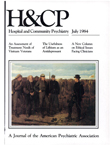Interminable Treatment in Patients Who Appear Healthy
Abstract
Treatment interminability among nonpsychotic psychiatric patients is a subject not well Understood. Those who treat such patients are often nagged by a feeling that they are somehow failing, especially if the patient has a history of personal achievement. The authors describe three such patients and propose that they exemplify a type of pseudeomaturation. Common features in the accounts of their childhood suggest a failure in the separation-individuation phase of development. The authors theorize that this failure first contributed to the development of psychiatric symptoms during adulthood and then to interminability in treatment.
Access content
To read the fulltext, please use one of the options below to sign in or purchase access.- Personal login
- Institutional Login
- Sign in via OpenAthens
- Register for access
-
Please login/register if you wish to pair your device and check access availability.
Not a subscriber?
PsychiatryOnline subscription options offer access to the DSM-5 library, books, journals, CME, and patient resources. This all-in-one virtual library provides psychiatrists and mental health professionals with key resources for diagnosis, treatment, research, and professional development.
Need more help? PsychiatryOnline Customer Service may be reached by emailing [email protected] or by calling 800-368-5777 (in the U.S.) or 703-907-7322 (outside the U.S.).



